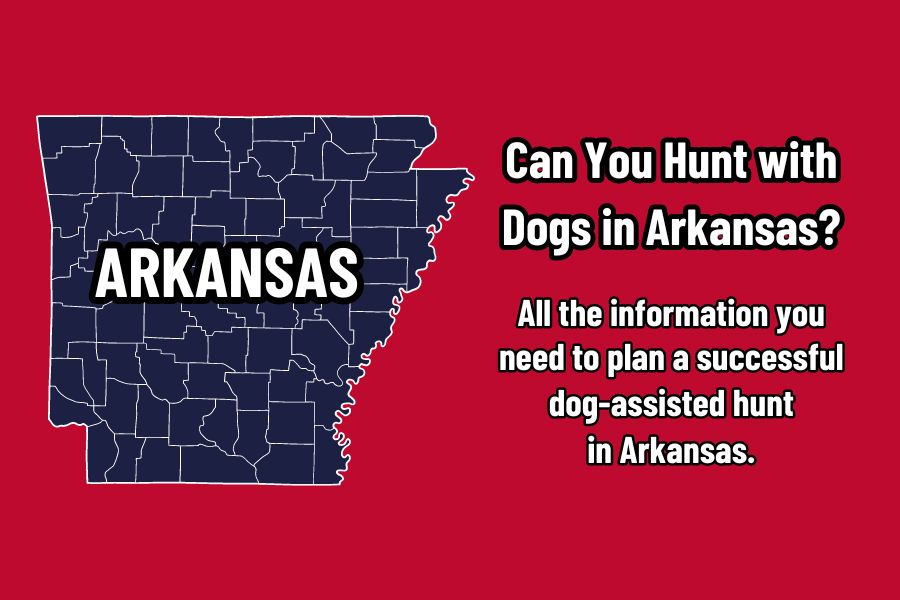Hunt with dogs in Arkansas! This comprehensive guide explores the diverse game species you can pursue with dogs, expert tips on hunter education, answers to pressing questions and a key list of resources. All the information you need to plan a successful dog-assisted hunt in Arkansas.
Introduction
Ever felt the rush of anticipation as you prep for a hunt, your loyal dog by your side, ready to tread through the diverse landscapes of Arkansas? That thrill of hunting with dogs in Arkansas isn’t just about the chase; it’s about companionship, strategy, and the deep-rooted tradition that binds us. You know the feeling, right? The early mornings, the planning, and that mix of excitement and challenge. It’s not just a hobby; it’s a way of life.
Acknowledging the pulsing heart of adventure and the silent nod of respect for the wilderness, you, the seasoned hunter, or maybe you, the eager beginner, are part of this unique tapestry. Wondering if you’re doing it right, or maybe thinking about how to start Arkansas hunting with dogs? You’re not alone. It’s the unspoken bond, the shared nods between us who tread through thickets and fields.
Let’s dive into the world of hunting in Arkansas, where every whisper of the leaves and the soft padding of paws on the earth tells a story. We’re about to uncover the secrets to mastering the art of hunt with dogs in Arkansas, threading through laws, tips, and tales of the wild. Ready? Let’s begin.
Hunting Feral Hogs in Arkansas
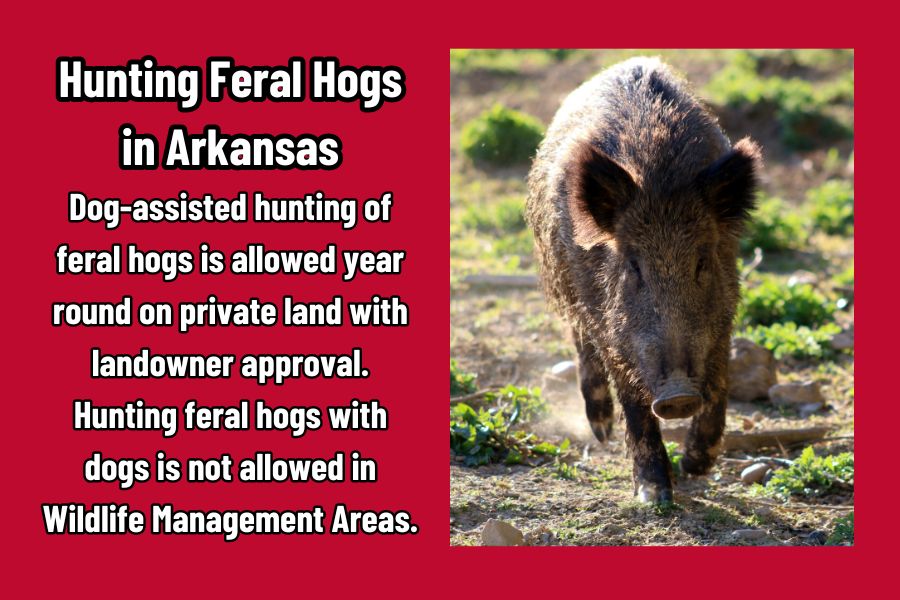
The feral hog situation in Arkansas is a double-edged sword. On one hand, these hogs, descendants of domestic pigs gone wild, offer an exhilarating hunt; on the other, they wreak havoc on local wildlife and habitats. Rooting around, they damage crops and native plants, pushing out deer and turkey populations. It’s a problem, sure, but also a hunting opportunity, especially if you’re keen on dog hunting in Arkansas.
Arkansas’s vast landscapes, from dense forests to wet marshlands, serve as the perfect backdrop for these hogs. They’re everywhere, but particularly abundant in the Mississippi Alluvial Plain and the Gulf Coastal Plain. This variety of terrains means you can experience different hunting adventures in one state. Now, think about that with your loyal dog by your side, tracking, chasing, and outsmarting these tough creatures. It’s not just hunting; it’s an adventure.
However, while you can hunt feral hogs year-round on private land with the landowner’s blessing, feral hog hunting in Arkansas has its limits, especially when it comes to using dogs. On Wildlife Management Areas (WMAs), dogs are off the guest list for hunting hogs. Why? It’s about balance and safety, maintaining the natural order and ensuring other wildlife aren’t disturbed or displaced.
And what about incidental take? This means if you’re legally hunting another game on WMAs and stumble upon a feral hog, you can take it down. It’s like nature’s surprise, turning your planned hunt into an unexpected thrill. But remember, this doesn’t give a green light to go hog wild with your dogs on WMAs. It’s a fine line, respecting the rules while embracing the wild unpredictability of hunting.
In essence, hunting with dogs in Arkansas for feral hogs gives you a front-row seat to nature’s rawest moments, balancing respect for wildlife with the primal thrill of the hunt. The feral hog chase in Arkansas is more than a hunt; it’s a test of skill and partnership with your canine companion, all while playing by the rules set by the Arkansas Game and Fish Commission.
Hunting Wildlife in Arkansas
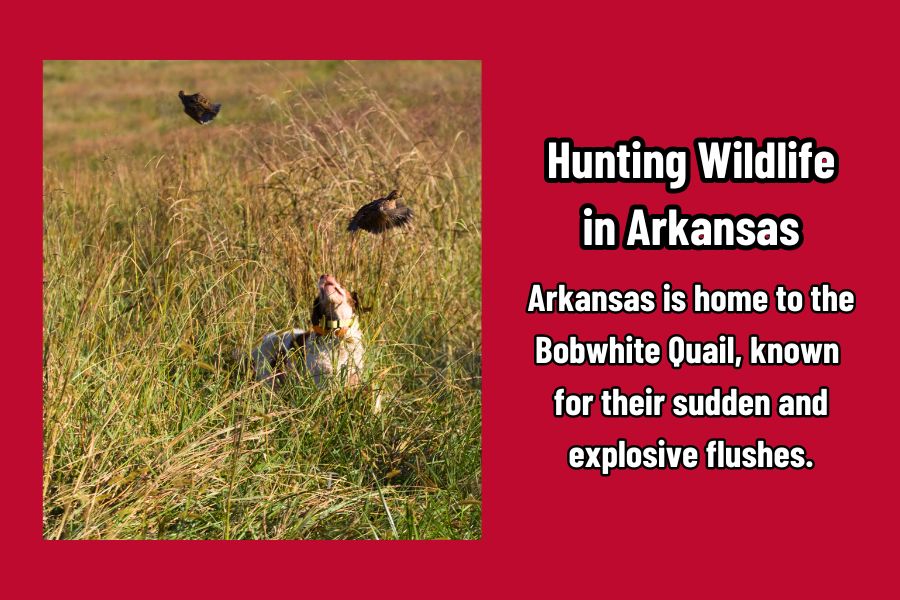
The Arkansas wilderness, where the thrill of the chase and the companionship of your trusted dog converge in the ultimate outdoor adventure. Hunting wildlife in Arkansas isn’t just a pastime; it’s a journey through diverse habitats, each with its own set of challenges and rewards.
From the elusive quail darting through the underbrush to the stealthy bobcat lurking in the shadows, every hunt is a story waiting to unfold. With a myriad of species, each offering a unique hunt, the excitement never wanes. Whether you’re tracking the swift flight of a crow or outsmarting a cunning coyote, a hunt with dogs in Arkansas promises an unparalleled experience, blending the raw beauty of nature with the age-old bond between hunter and hound.
Ready to step into this wild tableau? Let’s explore the rich tapestry of game and the deep-rooted hunting traditions that Arkansas offers.
Hunting Quail in Arkansas
Arkansas is home to the Bobwhite Quail, thriving in the grasslands and open forests, offering hunters plentiful opportunities. Quail hunting, especially with dogs, is a tradition here, enhancing the experience as these birds are known for their sudden, explosive flushes. Hunt with dogs in Arkansas for quail is not just allowed; it’s a celebrated part of the culture, with no exceptions to this rule.
Hunting Rabbit in Arkansas
Rabbits, particularly the Eastern Cottontail, are abundant across Arkansas’s diverse habitats, from thickets to open fields. Rabbit hunting is a fantastic way for beginners to get into hunting game in Arkansas, with dogs playing a crucial role in flushing and retrieving. Here, dog-assisted hunting is not just allowed; it’s a staple of the hunting scene.
Hunting Squirrel in Arkansas
The state’s forests are alive with Gray and Fox squirrels, making squirrel hunting a popular pursuit. With their acrobatic movements and keen senses, squirrels offer a challenging hunt that’s enhanced by the use of dogs. In Arkansas, hunting these nimble creatures with dogs is not only allowed but also adds to the rich tapestry of hunt with dogs in Arkansas.
Hunting Crow in Arkansas
Crows, found statewide, may not be the first species that comes to mind for hunting, but they offer unique challenges. With their intelligence and wariness, crows keep hunters and dogs alike on their toes. In Arkansas, using dogs to hunt crows adds a layer of strategy and excitement, fully allowed and embraced within the hunting community.
Furbearer: Hunting Gray Fox in Arkansas
Gray foxes, with their elusive nature, are found in the wooded areas of Arkansas. Hunting these adept climbers provides a thrilling experience, and while using dogs is generally allowed, hunters should ensure they are respecting local regulations and not disturbing other wildlife.
Furbearer: Hunting Red Fox in Arkansas
The Red Fox, with its distinctive coloring and cunning, inhabits the more open areas of Arkansas. Hunting them with dogs is a practice steeped in tradition, offering hunters a challenging yet rewarding experience, with few restrictions on using dogs.
Furbearer: Hunting Muskrat in Arkansas
Muskrats, prevalent in Arkansas’s wetlands, provide hunters with opportunities for water-based hunting. While dogs can be used to assist in these hunts, it’s essential to be mindful of the habitat and ensure the use of dogs doesn’t disrupt the ecosystem.
Furbearer: Hunting Mink in Arkansas
Mink, small and elusive, inhabit the waterways of Arkansas. Hunting mink with dogs can be an exciting endeavor, with the caveat that hunters must always be considerate of the balance between sport and conservation.
Furbearer: Hunting Opossum in Arkansas
Opossums, nocturnal and widespread, are another furbearer species hunted in Arkansas. Utilizing dogs in these hunts is allowed, providing a unique nighttime hunting experience that respects the animal and the environment.
Furbearer: Hunting Raccoon in Arkansas
Raccoons, abundant and clever, are a favorite for hunters seeking a challenging yet fun experience. In Arkansas, using dogs for raccoon hunting is a tradition, with the night hunts echoing with barks and calls, though always within the bounds of respect for nature.
Furbearer: Hunting Striped Skunk in Arkansas
The Striped Skunk, known for its distinct odor and nocturnal habits, is found throughout Arkansas. While hunting skunks with dogs is allowed, it’s a less common practice, with hunters needing to be cautious of the skunk’s defensive spray.
Furbearer: Hunting River Otter in Arkansas
River Otters, playful and aquatic, are pursued for their valuable pelts. In Arkansas, while day hunting with dogs for otters is allowed, it’s important to follow specific regulations to ensure sustainable hunting practices.
Furbearer: Hunting Bobcat in Arkansas
Bobcats, elusive and solitary, are a prized hunt in Arkansas. While day and night hunts are permissible, using dogs to track and tree bobcats is a respected method, offering an intense hunting experience that demands skill and patience.
Furbearer: Hunting Coyote in Arkansas
Coyotes, adaptable and widespread, present hunting opportunities across Arkansas. While dog-assisted hunting is allowed, it’s prohibited during turkey season to avoid disturbance to other wildlife, showcasing the balance Arkansas maintains between hunting and conservation.
Furbearer: Hunting Beaver in Arkansas
Beavers, with their aquatic habitats and dam-building activities, are hunted for their pelts and to manage their impact on waterways. In Arkansas, hunting beavers with dogs during the day is an allowed practice that aids in controlling their population.
Furbearer: Hunting Nutria in Arkansas
Nutria, invasive and destructive to wetlands, are hunted to protect Arkansas’s ecosystems. Daytime hunting with dogs is permitted, providing an essential role in managing these populations and preserving natural habitats.
Hunting Elk in Arkansas
Elk, majestic and imposing, roam the rugged landscapes of Arkansas, particularly in the Ozark and Ouachita Mountains. While they present a grand hunting opportunity, using dogs for elk hunting is not allowed, ensuring these large animals are pursued with fair chase ethics in mind.
Hunting Bear in Arkansas
Black Bears, symbolizing Arkansas’s wilderness, are found in the state’s dense forests. Bear hunting is a revered tradition, but hunting these powerful animals with dogs is not permitted, reflecting the respect and caution these hunts demand.
Hunting Deer in Arkansas
Deer, the quintessential game in Arkansas, are hunted widely, with white-tailed deer being the most common. While dog-assisted hunting is generally not allowed, certain areas and times may permit it, underlining the importance of checking current regulations to ensure a respectful and lawful hunt.
Hunting Turkey in Arkansas
Turkey hunting is a cherished springtime activity in Arkansas, with the Eastern Wild Turkey being the primary target. Hunting turkeys with dogs is not allowed, preserving the tradition of stealth and skill in turkey hunting and ensuring a fair pursuit of these elusive birds.
Hunting Waterfowl in Arkansas
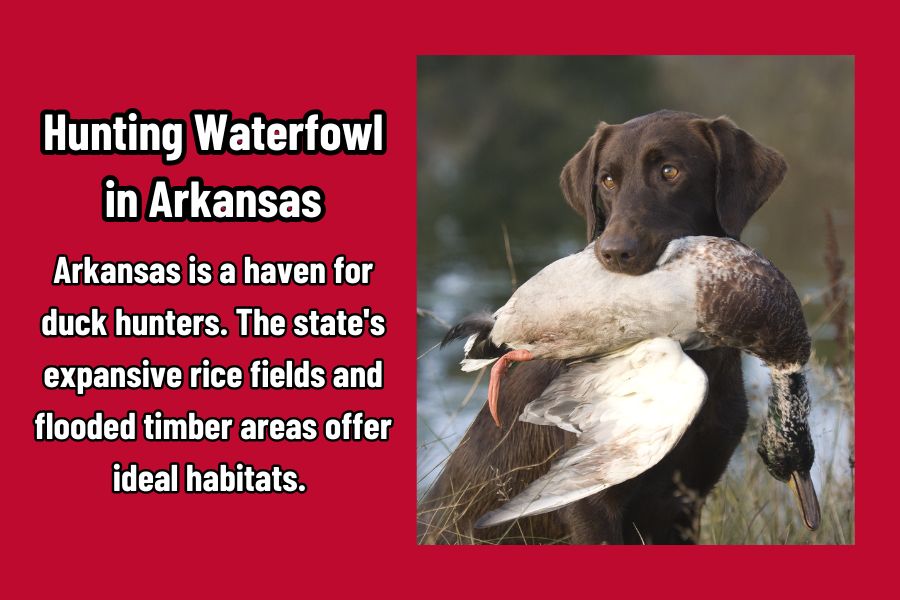
Whispering reeds, misty mornings, and the quiet lapping of water set the stage for the waterfowl hunter in Arkansas. It’s here, amidst the serene yet wild wetlands, that hunters and their loyal dogs blend into the landscape, awaiting the telltale sound of wings through the crisp air.
The experience of waterfowl hunting in this state is more than just a sport; it’s a sacred dance between man, animal, and nature. As you set your sights on ducks, geese, or the elusive woodcock, the bond with your dog deepens, each retrieve a testament to years of trust and training.
You’re not just pursuing game on a hunt with dogs in Arkansas; you’re living a tradition that echoes through the marshes and fields, a rhythm that pulses in the heart of every hunter who’s felt the thrill of the chase and the chill of the dawn.
Hunting Duck in Arkansas
Arkansas is a haven for duck hunters, with species like Mallards, Wood Ducks, and Teal frequenting its wetlands and rivers. The state’s expansive rice fields and flooded timber areas offer ideal habitats for these birds, making it a premier destination for hunt with dogs in Arkansas. With dogs, hunters can effectively retrieve birds from difficult terrains, enhancing the hunting experience with no notable exceptions.
Hunting Coot in Arkansas
Coots, often found in the same wetlands as ducks, provide an additional hunting opportunity in Arkansas. These birds, more aquatic than their landfowl counterparts, create a unique hunting scenario where dogs excel in retrieval, navigating the murky waters and thick vegetation. Bird dog hunting in Arkansas for coots is not just allowed; it’s an integral part of the waterfowl hunting culture.
Hunting Merganser in Arkansas
Mergansers, with their sleek bodies and diving abilities, are found in the larger lakes and rivers of Arkansas. These birds offer a challenging hunt, often requiring precise shots and quick retrievals, where hunting dogs are invaluable, especially in retrieving from icy or swift waters, making dog assisted hunting in Arkansas a preferred method.
Hunting Snow Goose in Arkansas
Snow Geese migrate through Arkansas in large numbers, presenting hunters with opportunities for high-volume hunting. The state’s open fields and wetlands are prime habitats for these birds. Hunting with dogs is allowed and is especially beneficial for managing downed birds over large areas, ensuring ethical and efficient hunts.
Hunting Blue Goose in Arkansas
The Blue Goose, a color morph of the Snow Goose, frequents the same habitats and is hunted under similar conditions. In Arkansas, these geese offer a distinctive challenge, with hunting dogs playing a key role in retrieving birds from extensive fields and marshes, thus, enhancing the waterfowl hunting in Arkansas experience.
Hunting White-fronted Goose in Arkansas
White-fronted Geese, or “Specklebellies,” are prized for their challenging hunt and delicious meat. Arkansas’s agricultural fields and wetlands provide perfect habitats for these birds. Hunting with dogs is permitted, helping hunters to efficiently manage retrieves in these vast landscapes.
Hunting Ross Goose in Arkansas
Ross Geese, smaller relatives of the Snow and Blue geese, are also present in Arkansas’s waterfowl scene. Like their larger counterparts, they are found in open, wet areas, and hunting with dogs is allowed, aiding hunters in collecting birds from wide-open spaces.
Hunting Canada Goose in Arkansas
The Canada Goose, a symbol of wild North America, is found in various Arkansas locales, from urban ponds to rural waterways. Hunting these adaptable birds with dogs is allowed, providing vital assistance in retrieving from both water and land, and adding value to the hunting expedition.
Hunting Teal in Arkansas
Teal, fast flyers and early migrants, offer exciting hunting opportunities in Arkansas’s wetlands and flooded fields. Dogs are particularly useful in these hunts for their speedy retrieval of downed birds, making these small but swift ducks a favorite among Arkansas hunters.
Hunting White-Winged Dove in Arkansas
White-Winged Doves, expanding in numbers and range, offer growing hunting opportunities in Arkansas. Found around agricultural lands and urban areas, these birds present a different hunting dynamic where dogs can be used to retrieve from difficult-to-access areas, enhancing the hunting experience.
Hunting Eurasian Collared-Dove in Arkansas
Eurasian Collared-Doves, non-native but now common in Arkansas, can be hunted without limit. These birds, often found in urban and suburban areas, provide a unique hunting challenge, with dogs assisting in retrieving from both open and confined spaces, showcasing the adaptability of hunt with dogs in Arkansas.
Hunting Virginia Rail in Arkansas
Virginia Rails, elusive and marsh-dwelling, are a less common but rewarding hunt in Arkansas. These birds inhabit dense wetlands, where dogs excel in flushing and retrieving, demonstrating the versatility and value of hunting with a canine companion.
Hunting Sora in Arkansas
Sora, small and secretive, are found in the marshy areas of Arkansas. Hunting these birds requires patience and stealth, with dogs aiding in flushing them out for a successful hunt, underscoring the intricate dance of hunter and dog in Arkansas’s diverse habitats.
Hunting Wilson’s Snipe in Arkansas
Wilson’s Snipe, with their erratic flight patterns, provide a thrilling hunting experience in Arkansas’s wet fields and marshes. Dogs are crucial in these hunts, tracking down the camouflaged birds and retrieving from challenging terrains, enhancing the hunting adventure.
Hunting Common Gallinules in Arkansas
Common Gallinules, found in Arkansas’s lakes and marshes, offer a vibrant hunt with their distinct calls and colorful appearance. Dogs aid in navigating the thick marsh vegetation to flush or retrieve these birds, adding depth to the hunting experience.
Hunting Purple Gallinules in Arkansas
Purple Gallinules, with their striking plumage and aquatic habitats, are a rare but exciting find for Arkansas hunters. The use of dogs in these hunts facilitates access to the dense aquatic vegetation where these birds are found, illustrating the effectiveness of canine assistance.
Hunting Woodcock in Arkansas
Woodcock, elusive and ground-dwelling, are hunted in the wooded and brushy areas of Arkansas. The challenge of hunting these birds lies in their cryptic nature and sudden flights, with dogs playing a key role in flushing and retrieving, making every hunt a testament to the skill and synergy of hunter and dog.
Hunter Education in Arkansas
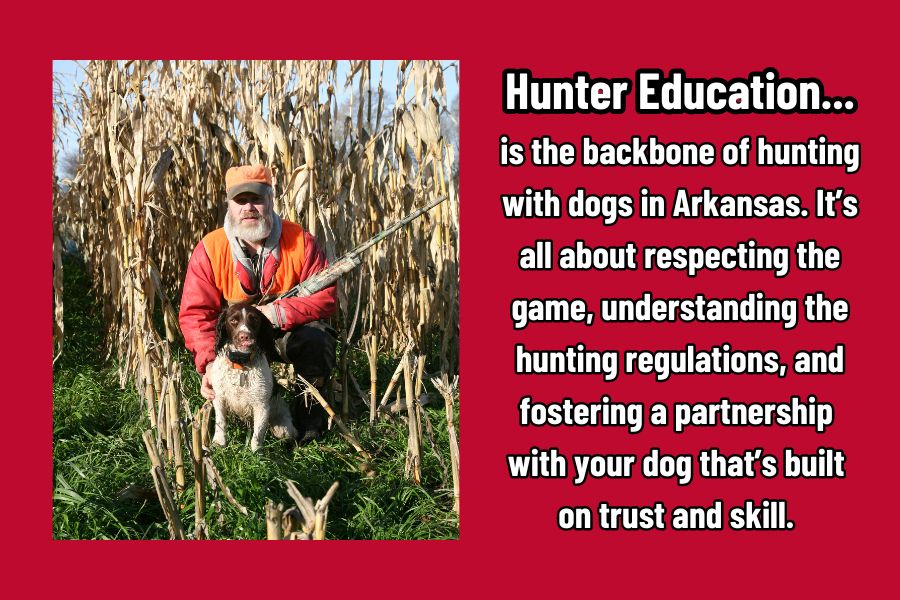
Hunter education is the backbone of hunting, especially important when you’re looking to hunt with dogs in Arkansas. This isn’t just about hitting targets; it’s about respecting the game, understanding the land, and fostering a partnership with your dog that’s built on trust and skill.
Whether you’re a seasoned hunter or new to the game, the learning never stops. It’s about honing your instincts, refining your techniques, and embracing the regulations that safeguard the sport and the species. Here, every lesson learned and every rule followed is a step towards becoming not just a hunter, but a guardian of the tradition and the environment.
So, let’s delve into the essentials of hunter education including hunting regulations and laws, ethics, and practices that make hunting with dogs in Arkansas a journey of continual growth and respect.
Hunter Education Card
In Arkansas, anyone born on or after January 1, 1969, must complete hunter education to hunt unaccompanied. It’s not just a formality; it’s about safety and conservation. This card is your ticket to understanding the responsibilities and joys of hunting, ensuring you’re prepared for the field, whether you’re aiming to hunt with dogs in Arkansas or venture out solo.
Free Instructor-Led Hunter Education
Arkansas offers free instructor-led courses for hunter education, blending classroom instruction with hands-on learning. These sessions cover everything from firearm safety to wildlife management, providing insights and skills crucial for ethical hunting. They’re not just classes; they’re stepping stones to becoming a conscientious hunter, vital for both seasoned enthusiasts and novices interested in dog hunting regulations in Arkansas.
Hunting Dog Regulations
Navigating the world of hunting with dogs in Arkansas means understanding specific hunting dog regulations to ensure safety and ethical hunting practices. These rules aren’t hurdles but guides to maintain harmony in the natural world and respect between hunters and wildlife.
- Hunting Dog Requirements: In Arkansas, hunting dogs must be trained, controlled, and used in ways that comply with state hunting regulations. This means your canine companion should be well-behaved and responsive, ensuring a safe and successful hunt that honors the spirit of hunter education in Arkansas.
- Dogs Chasing Wildlife For Pleasure Restrictions: Letting dogs chase wildlife for fun is a no-go in Arkansas. It’s about respecting the wildlife and ensuring that the natural behaviors and habitats aren’t disrupted by recreational pursuits, maintaining the ethical balance crucial for conservation and hunting traditions.
- Deer Dog Training Restrictions: Training dogs to hunt deer in Arkansas comes with specific restrictions to prevent undue stress on wildlife and maintain order during hunting seasons. These rules underscore the importance of responsible training and hunting, aligning with the state’s conservation goals.
- Hunting Deer With Dogs Prohibited: In Arkansas, using dogs to hunt deer is prohibited to ensure fair chase principles and minimize stress on deer populations. It’s a reflection of the state’s commitment to ethical hunting practices and wildlife management, crucial for maintaining healthy deer herds.
- Chasing Elk With Dogs Prohibited: Similarly, chasing elk with dogs is off-limits in Arkansas. This rule protects these majestic animals from undue stress and disturbance, reinforcing the state’s dedication to wildlife conservation and ethical hunting practices.
- Bird Dog Training Restrictions: Training bird dogs in Arkansas is subject to specific rules to ensure that the training does not negatively impact the natural wildlife and their habitats. These regulations support sustainable hunting practices and the preservation of Arkansas’s rich bird life.
- Retrieving Dog Training Restrictions: Restrictions on training retrieving dogs in Arkansas are designed to ensure that these activities are conducted in a controlled and ethical manner, minimizing the impact on wildlife and supporting the principles of fair chase and conservation in hunting activities.
Unleash Your Dogs!
Venturing into the wild with a loyal dog at your side, feeling that surge of anticipation as you both sense the adventure ahead – it’s an experience like no other. Hunt with dogs in Arkansas and you tap into a tradition that’s as old as the hills, yet fresh with each sunrise. We’ve journeyed through the diverse landscapes, from the silent stalk in the duck marshes to the stealthy pursuit of furbearers under the cloak of night, each hunt a testament to the bond between hunter and canine.
You might be sitting there, pondering over maps and seasons, feeling that itch to step out into the dawn, dog by your side, heart full of anticipation. It’s that call of the wild, the silent conversation between you and the great outdoors, urging you to partake in the dance of nature. We get it, and it’s why we dove deep into the woods and waters of Arkansas dog hunting, guiding you through the nuances of regulations and opportunities, all to stoke the flames of your passion.
So, as the seasons roll in, let this guide be your compass. The landscapes of Arkansas, rich with game and tradition, await you and your four-legged companion. With every step, every heartbeat, you’re not just hunting; you’re living a legacy, continuing a story woven with each track, each call, each retrieve. The possibilities are truly endless, beckoning you to start planning your next hunt with dogs in Arkansas. Go on, answer the call – the wild awaits.
FAQs: Hunt with Dogs in Arkansas
What Kinds of Licenses or Permits Do I Need to Hunt in Arkansas?
Hunt with Dogs in Arkansas Answer:
To join the ranks of hunters in Arkansas, you’ll need the appropriate Arkansas hunting license, tailored to what you plan to hunt and whether you’re a resident or visitor. For hunting with dogs, there’s no separate permit, but your hunting license must match the game you’re after. Ensure you’re covered for the species and season before heading out.
Do I need a Hunter Education Card in Arkansas?
Hunt with Dogs in Arkansas Answer:
Yes, if you were born on or after January 1, 1969, you need a Hunter Education Card to hunt alone in Arkansas. It’s more than a piece of paper; it’s your pass to ethical, safe hunting practices, ensuring you know the ropes, whether it’s solo or as part of a hunt with dogs in Arkansas.
Why are Feral Hogs bad for other wildlife in Arkansas?
Hunt with Dogs in Arkansas Answer:
Feral hogs are like the bullies of the Arkansas wilderness, pushing out native species by gobbling up resources and damaging habitats. Their rooting and wallowing disrupt ecosystems, leading to erosion, water pollution, and a decrease in native wildlife populations, which is why managing their numbers is crucial.
Where do I find hunting dog regulations for Arkansas?
Hunt with Dogs in Arkansas Answer:
Hunting dog regulations in Arkansas are outlined by the Arkansas Game and Fish Commission. These rules are essential for maintaining the balance between hunting practices and wildlife conservation. For the most current regulations, check their official guidebook, which is a goldmine of information for anyone involved in Arkansas hunting with dogs.
Can I put up a blind in Arkansas?
Hunt with Dogs in Arkansas Answer:
Yes, you can set up a blind in Arkansas, but there are rules to follow, especially on private property. Using agricultural crops or natural vegetation is fine, as long as it doesn’t lead to the spread of grain, which could be construed as baiting. It’s about being smart and respectful, ensuring your hideout blends in without bending the rules.
What is Legal shot for waterfowl in Arkansas?
Hunt with Dogs in Arkansas Answer:
When hunting waterfowl in Arkansas, the law is clear: only U.S. Fish and Wildlife Service-approved nontoxic shot is allowed. For sizes, think T (.2-inch diameter) or smaller. It’s not just about following the law; it’s about protecting our wildlife and habitats from the harmful effects of lead, ensuring that the hunting legacy continues safely and sustainably.
Resources for Hunting with Dogs in Arkansas
General Notes
This guide serves as a foundational resource for those eager to hunt with dogs in Arkansas. While we strive to present comprehensive and current information, hunting regulations and legalities are fluid and can change. It’s crucial to stay informed with the latest rules to ensure your hunting activities are both legal and respectful. For the most rewarding and compliant hunting experience, regularly consult up-to-date resources offered by the State of Arkansas. Refer to AGFC links provided below.
AGFC – Important Links
For those immersed in Arkansas dog hunting, staying informed is key. The Arkansas Game and Fish Commission (AGFC) offers extensive resources to help hunters understand laws, regulations, and opportunities for hunting with dogs:
AGFC – Arkansas Game and Fish Commission Website
AGFC – General Hunting Regulations
AGFC – 2023-24 Arkansas Hunting Guide Book
AGFC – 2023-24 Arkansas Waterfowl Hunting Guidebook
AGFC – Hunting Dog Regulations
AGFC – Quick Links
Staying informed with these resources ensures that your hunt with dogs in Arkansas is both enjoyable and in compliance with the latest regulations.
Check out our posts: Can You Hunt with Dogs in…
Alabama
Alaska
Arizona

